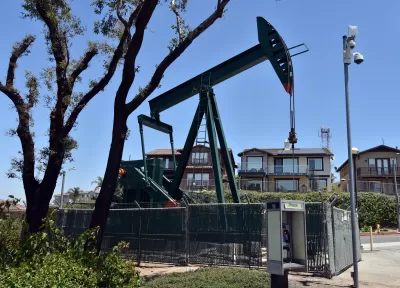Environmentalists gear up for battle to reject a referendum funded by Big Oil on a law passed last year that would ban oil and gas drilling within 3,200 feet of homes, schools, nursing homes, and hospitals.

After years of unsuccessful efforts to mandate health and safety buffer zones around oil and gas wells in California, Democratic state legislators managed to pass Senate Bill (SB) 1137 last year.
“The legislation prohibits the California Geologic Energy Management Division from approving a new oil well within 3,200 feet of a ‘sensitive receptor,’ defined as a residence, education resource, community resource, healthcare facility, dormitory or any building open to the public, reported Taryn Luna for the Los Angeles Times on Aug. 31, 2022.
Opponents argued that the bill would raise already sky-high gas prices and criticized the rushed nature in which the legislation was approved during floor debates in the Legislature.
Joe Garofoli, San Francisco Chronicle’s senior political writer who covers national and state politics, reported on July 26 that a “committee backed by environmentalists and community groups — launched with $500,000 in seed funding by ex-Google CEO Eric Schmidt — will announce Wednesday it is fighting the referendum that would overturn SB 1137.
The new committee, called the Campaign for a Safe and Healthy California, is hoping to counter a ballot measure on the November 2024 slate that is funded with at least $20 million from oil companies called Stop the Energy Shutdown. The oil company funded committee, backed with $4.5 million from Sentinel Peak Resources California LLC, and other petroleum companies, wants to overturn SB1137. The law has been on hold since the secretary of state certified the industry-backed ballot measure.
Governor weighs in
Gov. Gavin Newsom made clear his dissatisfaction, to put it mildly, with the oil industry when the referendum was certified in February for placement on the Nov. 5, 2024 ballot, the second referendum to qualify to date that would repeal laws passed by the legislature.
“It’s one thing for Big Oil to make record profits as they rip off Californians at the pump, he said on Feb 3 in a statement.
[See related post: Holding Oil Companies Accountable for California's High Fuel Prices, April 4, 2023]
“It’s quite another to push to continue harmful drilling near daycares and schools and our homes.”
The two sides
Oil companies sponsoring the referendum maintain that oil not produced in California must come from countries without the stiff regulations imposed on the state's drillers.
“California oil extractors produce the only climate-compliant oil in the world and follow the world’s strictest environmental and labor laws,” Rock Zierman, chief executive officer of the California Independent Petroleum Association, said in a statement. “Every barrel we don’t produce here must be tankered into our crowded ports, mostly from countries that oppress LGBTQ+ communities, restrict women’s rights, and decimate the world’s rainforests and environment.”
In fact, California oil production has decreased for nearly four decades, replaced, as Zierman noted, by foreign sources, according to the California Energy Commission. Alaskan oil imports have decreased for nearly the same time period.
Outspent but not out-motivated
Chris Lehman, who is managing the Campaign for a Safe and Healthy California, “said he is confident that his side will be able to raise enough to get its message out,” added Garofoli.
Californians do not want toxic oil drilling next to their schools, next to neighborhoods, hospitals, period,” Lehman said. “As long as we can make the case that that’s what this does, we’re going to be fine.”
FULL STORY: New political group launches to take on Big Oil over a ban on drilling near schools, hospitals

Planetizen Federal Action Tracker
A weekly monitor of how Trump’s orders and actions are impacting planners and planning in America.

San Francisco's School District Spent $105M To Build Affordable Housing for Teachers — And That's Just the Beginning
SFUSD joins a growing list of school districts using their land holdings to address housing affordability challenges faced by their own employees.

The Tiny, Adorable $7,000 Car Turning Japan Onto EVs
The single seat Mibot charges from a regular plug as quickly as an iPad, and is about half the price of an average EV.

Seattle's Plan for Adopting Driverless Cars
Equity, safety, accessibility and affordability are front of mind as the city prepares for robotaxis and other autonomous vehicles.

As Trump Phases Out FEMA, Is It Time to Flee the Floodplains?
With less federal funding available for disaster relief efforts, the need to relocate at-risk communities is more urgent than ever.

With Protected Lanes, 460% More People Commute by Bike
For those needing more ammo, more data proving what we already knew is here.
Urban Design for Planners 1: Software Tools
This six-course series explores essential urban design concepts using open source software and equips planners with the tools they need to participate fully in the urban design process.
Planning for Universal Design
Learn the tools for implementing Universal Design in planning regulations.
Smith Gee Studio
City of Charlotte
City of Camden Redevelopment Agency
City of Astoria
Transportation Research & Education Center (TREC) at Portland State University
US High Speed Rail Association
City of Camden Redevelopment Agency
Municipality of Princeton (NJ)





























